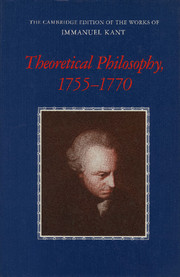Book contents
- Frontmatter
- Contents
- General editors' preface
- Preface
- Guide to abbreviations
- General introduction
- Introductions to the translations
- Résumés of the works
- A NEW ELUCIDATION OF THE FIRST PRINCIPLES OF METAPHYSICAL COGNITION (1755)
- THE EMPLOYMENT IN NATURAL PHILOSOPHY OF METAPHYSICS COMBINED WITH GEOMETRY, OF WHICH SAMPLE I CONTAINS THE PHYSICAL MONADOLOGY (1756)
- AN ATTEMPT AT SOME REFLECTIONS ON OPTIMISM (1759)
- THE FALSE SUBTLETY OF THE FOUR SYLLOGISTIC FIGURES (1762)
- THE ONLY POSSIBLE ARGUMENT IN SUPPORT OF A DEMONSTRATION OF THE EXISTENCE OF GOD (1763)
- ATTEMPT TO INTRODUCE THE CONCEPT OF NEGATIVE MAGNITUDES INTO PHILOSOPHY (1763)
- INQUIRY CONCERNING THE DISTINCTNESS OF THE PRINCIPLES OF NATURAL THEOLOGY AND MORALITY (1764)
- M. IMMANUEL KANT'S ANNOUNCEMENT OF THE PROGRAMME OF HIS LECTURES FOR THE WINTER SEMESTER 1765 — 1766 (1765)
- DREAMS OF A SPIRIT-SEER ELUCIDATED BY DREAMS OF METAPHYSICS (1766)
- CONCERNING THE ULTIMATE GROUND OF THE DIFFERENTIATION OF DIRECTIONS IN SPACE (1768)
- ON THE FORM AND PRINCIPLES OF THE SENSIBLE AND THE INTELLIGIBLE WORLD [INAUGURAL DISSERTATION] (1770)
- Section 1 On the concept of a world in general
- Section 2 On the distinction between sensible things and intelligible things in general
- Section 3 On the principles of the form of the sensible world
- Section 4 On the principle of the form of the intelligible world
- Section 5 On method in metaphysics concerning what is sensitive and what belongs to the understanding
- Factual notes
- Bibliographies of editions and translations
- Glossary
- Biographical-bibliographical sketches of persons mentioned by Kant
- Index
Section 5 - On method in metaphysics concerning what is sensitive and what belongs to the understanding
Published online by Cambridge University Press: 18 December 2014
- Frontmatter
- Contents
- General editors' preface
- Preface
- Guide to abbreviations
- General introduction
- Introductions to the translations
- Résumés of the works
- A NEW ELUCIDATION OF THE FIRST PRINCIPLES OF METAPHYSICAL COGNITION (1755)
- THE EMPLOYMENT IN NATURAL PHILOSOPHY OF METAPHYSICS COMBINED WITH GEOMETRY, OF WHICH SAMPLE I CONTAINS THE PHYSICAL MONADOLOGY (1756)
- AN ATTEMPT AT SOME REFLECTIONS ON OPTIMISM (1759)
- THE FALSE SUBTLETY OF THE FOUR SYLLOGISTIC FIGURES (1762)
- THE ONLY POSSIBLE ARGUMENT IN SUPPORT OF A DEMONSTRATION OF THE EXISTENCE OF GOD (1763)
- ATTEMPT TO INTRODUCE THE CONCEPT OF NEGATIVE MAGNITUDES INTO PHILOSOPHY (1763)
- INQUIRY CONCERNING THE DISTINCTNESS OF THE PRINCIPLES OF NATURAL THEOLOGY AND MORALITY (1764)
- M. IMMANUEL KANT'S ANNOUNCEMENT OF THE PROGRAMME OF HIS LECTURES FOR THE WINTER SEMESTER 1765 — 1766 (1765)
- DREAMS OF A SPIRIT-SEER ELUCIDATED BY DREAMS OF METAPHYSICS (1766)
- CONCERNING THE ULTIMATE GROUND OF THE DIFFERENTIATION OF DIRECTIONS IN SPACE (1768)
- ON THE FORM AND PRINCIPLES OF THE SENSIBLE AND THE INTELLIGIBLE WORLD [INAUGURAL DISSERTATION] (1770)
- Section 1 On the concept of a world in general
- Section 2 On the distinction between sensible things and intelligible things in general
- Section 3 On the principles of the form of the sensible world
- Section 4 On the principle of the form of the intelligible world
- Section 5 On method in metaphysics concerning what is sensitive and what belongs to the understanding
- Factual notes
- Bibliographies of editions and translations
- Glossary
- Biographical-bibliographical sketches of persons mentioned by Kant
- Index
Summary
§23
In all the sciences of which the principles are given intuitively, whether it be by sensory intuition (experience) or by sensitive but pure intuition (the concepts of space, time and number), that is to say, in natural science and mathematics, use gives the method. After a science has attained a certain fullness and orderliness, trial and error show what path and what procedure must be pursued if it is to be brought to completion, and made to shine the more purely, once the blemishes both of mistakes and of confused thoughts have been eliminated. It was in exactly this way that grammar, after a richer use of speech had been established, and style, after elegant examples of poetry and oratory had been furnished, provided a foothold for rules and method. But the use of the understanding in sciences of this kind, the fundamental concepts and axioms of which are given by sensitive intuition, is only the logical use of the understanding. That is to say, it is the use by which we simply subordinate cognitions to one another, according to their universality and in conformity with the principle of contradiction, and by which we subordinate phenomena to more general phenomena, and the corollaries of pure intuition to intuitive axioms. But in pure philosophy, such as metaphysics, the use of the understanding in dealing with principles is real; that is to say, the fundamental concepts of things and of relations, and the axioms themselves, are given in a fundamental fashion by the pure understanding itself; and, since they are not intuitions, they are not immune to error. Here, in pure philosophy, method precedes all science. And everything which is attempted before the rules of this method have been properly hammered out and firmly established will appear to have been rashly conceived and to deserve to be relegated to the vain playthings of the mind.
- Type
- Chapter
- Information
- Theoretical Philosophy, 1755–1770 , pp. 406 - 416Publisher: Cambridge University PressPrint publication year: 1992



